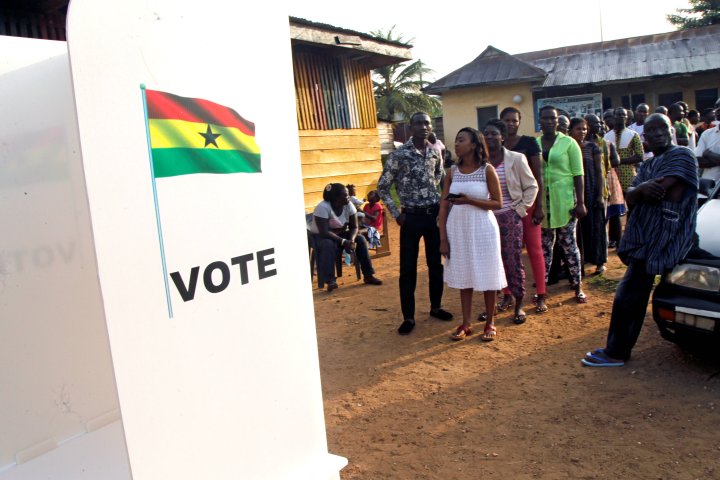ISS TODAY OP-ED
Peaceful Ghana by-elections yield critical lessons for managing 2024 national polls

From an absence of violence to large-scale vote buying, the outcomes of two recent elections cannot be ignored.
Two by-elections this year were fiercely contested by Ghana’s leading political parties — the governing New Patriotic Party (NPP) and the main opposition, the National Democratic Congress (NDC). Given that the country’s Parliament is split, with each party fielding 137 representatives, these polls were a crucial test ahead of the 2024 general elections.
The 23 May by-election was in Kumawu in the Ashanti Region — an NPP stronghold. The second took place on 27 June in Assin North, a key swing constituency in the Central Region. The conduct and outcomes of both present valuable lessons for political parties, the Electoral Commission and security agencies.
The first is the generally peaceful atmosphere that characterised voting, unlike previous by-elections in areas such as Ayawaso West Wuogon, Talensi and Akwatia. Some initial tensions, especially in Assin North, were calmed after the Inspector-General of Police met with the political parties. This inspired confidence in the security arrangements among the political elite, giving party vigilantes (private security groups in political parties) who disturbed previous by-elections little reason to interfere.
Read more in Daily Maverick: Tensions cloud December polls in Ghana
If police can build trust between the two parties ahead of 2024’s polls, the violence caused by these vigilantes that has marred previous national elections will be minimised. The police report on the 2020 presidential and parliamentary polls indicated that 21 incidents of violence and six cases of gunshots led to 19 injuries and five deaths.
Vote buying backfiring
A second, though disturbing, lesson from Kumawu and Assin North is the large-scale vote buying before and during the polls, which has increased in Ghana since 2008. According to media reports, the NPP and NDC gave cash and other inducements to persuade people to vote for their preferred candidates.
Politics in Ghana has become an expensive undertaking. The Center for Democratic Development Ghana survey estimated it would cost at least $100-million to win presidential elections. Most of this is spent on campaigning and voter inducement, and the electorate now seems to expect payments before voting.
According to a Global InfoAnalytics post-election survey, 96% of voters in Assin North witnessed vote buying, while 92% confirmed receiving some inducement — such as cash, farm tools, motorbikes or bicycles — to vote in a particular way.
Nonetheless, electorates are becoming more cynical, and politicians can no longer take them for granted. Global InfoAnalytics data showed that financial inducements don’t guarantee a particular vote. In Assin North, 29% of those receiving inducement from the NDC voted against its candidate, and 42% getting incentives from the NPP voted against it.
Likewise, hurriedly started pre-election projects, which many analysts believed were initiated to influence polling, caused 46% of voters in Assin North to vote against the government. Vote buying is starting to have negative returns, especially in swing constituencies.
Voting irregularities curbed
Another lesson is that investing in quality senior party agents at polling and collation centres pays off. During the two by-elections, members of Parliament (MPs), ministers, District Chief Executives and high-ranking officials served as party agents. This reduced the malpractice and irregularities that typically occur during polling. Because they fully understand the process, they could effectively monitor voting and ensure that Electoral Commission officers’ counting, collation and reporting were done according to the law.
This is significant considering that most previous election petitions, whether parliamentary or presidential, have raised countless incidents of alleged electoral malpractice and fraud. These occurrences will be minimised if political parties use top-quality agents on voting day.
The last and most important lesson is revealed by the election results. These confirm a nationwide disaffection with the ruling party, as many Ghanaians believe the country is headed in the wrong direction. Although the NPP won the Kumawu elections, its tally increased by a mere 304 votes over the 14,960 it polled in 2020. The independent candidate, who was once a party member and won 11,698 votes in 2020, secured only 2,478 votes this year.
This suggests apathy in the party’s stronghold, with voter turnout dropping from over 84% in 2020 to 63% in 2023. And the total valid votes during the Kumawu by-election was reduced by almost 7,632 from its 2020 number. Similarly, in Assin North, the NPP couldn’t improve its 2020 performance. The party had 1,563 fewer votes this year than in 2020. These outcomes confirm the party is losing popularity.
There are also lessons for the opposition NDC. Although the NPP is facing apathy among its base and a loss of goodwill among floating voters, this doesn’t necessarily translate into support for the NDC. The party managed to get more votes in Kumawu than in 2020, but not enough to win.
The NDC won Assin North, but with a reduction of 253 votes. This means the party lost ground compared to 2020, and could not attract more floating voters in a vital swing constituency like Assin North.
In 2024, the NPP could face mass apathy in its strongholds and disenchantment among Ghanaians. However, this won’t translate into automatic votes for the NDC. Both parties need to work hard to win next year.
The Electoral Commission must build trust among political parties and resolve its impasse with the NDC, which continues to boycott Inter-Party Advisory Council meetings over mistrust in the commission.
Security agencies must assure the parties about arrangements ahead of the 2024 polls. The police and the special prosecutor’s office should also enforce existing legislation on bribing and inducements during elections. DM
Enoch Randy Aikins, Researcher, African Futures and Innovation, Institute for Security Studies (ISS) Pretoria.
First published by ISS Today.

















Comments - Please login in order to comment.